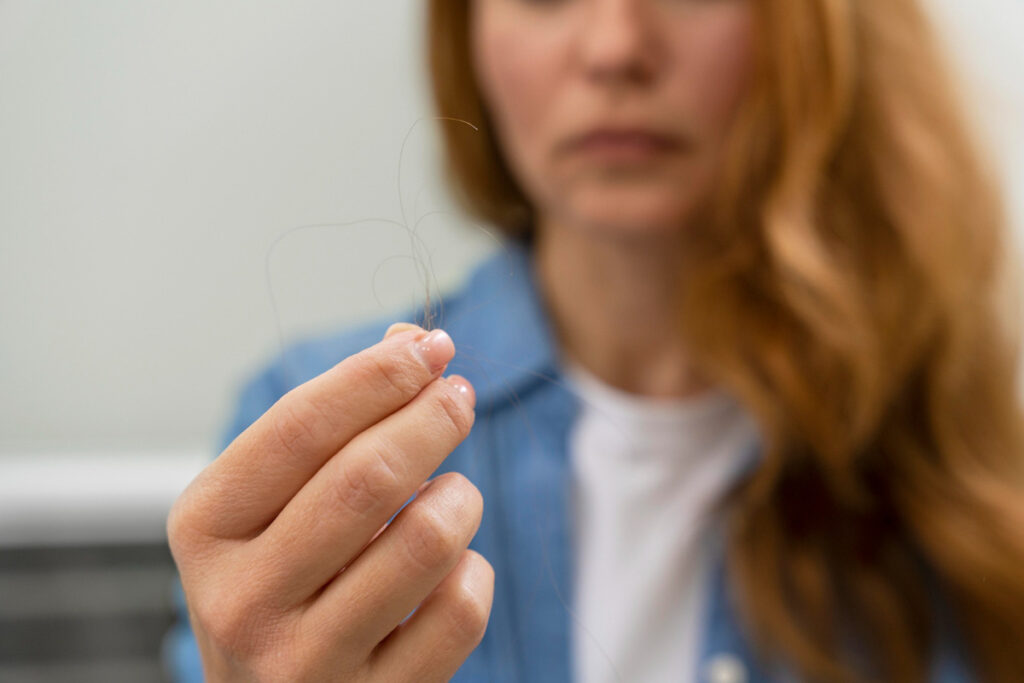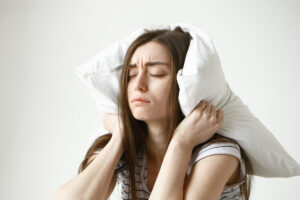Can weight loss cause hair loss?
It’s a question many people ask, especially after undergoing significant weight loss.
Whether from diet, exercise, or surgical procedures, shedding pounds can sometimes be accompanied by unexpected hair thinning or shedding.
While this can be concerning, it’s essential to understand the underlying reasons behind this connection and how to address it effectively.
Can Weight Loss Cause Hair Loss?
Yes, weight loss can cause hair loss, particularly if the weight loss is rapid or extreme.
Rapid weight loss can trigger a condition called telogen effluvium, a temporary form of hair loss that occurs when the hair follicles enter a resting phase prematurely.
When your body experiences significant changes, such as dramatic weight loss, it can go into survival mode, prioritizing essential functions like vital organ function over processes like hair growth.
As a result, hair may shed more than usual, leading to noticeable thinning or patchy hair loss.
While this type of hair loss is often temporary, it can be distressing and may take several months for hair growth to resume.
How Nutritional Deficiencies Contribute to Hair Loss During Weight Loss
One of the primary reasons weight loss can lead to hair loss is due to nutritional deficiencies.
When you lose weight, especially through a restrictive diet or extreme calorie reduction, you may not be getting the nutrients your hair needs to stay healthy.
Hair requires a variety of vitamins and minerals to grow and remain strong.
Nutrients like iron, zinc, vitamin D, and biotin are essential for maintaining healthy hair follicles.
Protein, in particular, plays a crucial role in hair health, as hair is made up of a protein called keratin.
A lack of sufficient protein in the diet can cause hair to become weak and brittle, and in severe cases, it can lead to hair loss.
Iron deficiency, which is common in those who follow low-calorie diets, can also result in hair thinning and shedding.
If your diet isn’t balanced and lacks these essential nutrients, your body may redirect resources away from non-essential functions, including hair growth, leading to hair loss during weight loss.
The Stress Connection: How Emotional and Physical Stress Contribute to Hair Loss
Stress is another significant factor in hair loss during weight loss.
Both physical and emotional stress can lead to telogen effluvium, as the body reacts to stress by shifting hair follicles into a resting phase.
When you’re undergoing weight loss, whether through exercise, diet changes, or other lifestyle shifts, it can put additional stress on your body.
This stress can lead to a temporary halt in hair growth, and hair loss can occur as a result.
Emotional stress, such as feeling overwhelmed or anxious about losing weight, can exacerbate the problem.
The body’s stress response triggers the release of cortisol, a hormone that, when elevated, can disrupt the normal hair growth cycle and contribute to hair thinning.
Additionally, physical stress, such as overexertion during intense workouts or not getting enough sleep, can further accelerate hair loss.
Managing stress through relaxation techniques and proper self-care is essential to maintaining healthy hair during weight loss.
Is Hair Loss After Weight Loss Permanent?
In most cases, hair loss after weight loss is temporary.
Once the body adjusts to the changes brought on by weight loss and nutritional intake is restored to a healthy level, hair growth should resume.
However, the duration of hair loss and recovery time can vary.
It may take several months for hair to return to its normal growth cycle after weight loss.
If hair loss continues for an extended period, or if it worsens despite efforts to improve nutrition and reduce stress, it may be a sign of a more significant underlying health issue.
In such cases, it’s essential to consult with a healthcare provider to determine the cause of the prolonged hair loss.
How to Prevent Hair Loss While Losing Weight
There are several ways to prevent or minimize hair loss during weight loss.
First, it’s essential to follow a balanced diet that includes plenty of protein, vitamins, and minerals that promote healthy hair growth.
Ensure you’re getting adequate amounts of iron, zinc, vitamin D, and biotin, as these are critical for hair health.
If you’re unsure about your nutrient intake, consider taking a multivitamin or a supplement designed to support hair growth.
Another important step is to avoid extreme calorie restriction.
Gradual weight loss, rather than rapid loss, helps prevent the body from going into survival mode, which can trigger hair loss.
Aim for a steady weight loss rate of 1-2 pounds per week to allow your body to adjust without unnecessary stress.
Stress management is also crucial.
Practice relaxation techniques like yoga, meditation, or deep breathing exercises to reduce the impact of emotional stress on your body.
Ensure that you get enough sleep to allow your body to recover and rebuild during the weight loss process.
Lastly, avoid harsh treatments or hairstyles that can damage your hair.
Minimize heat styling and chemical treatments to reduce hair breakage and further damage.
Treatments for Hair Loss After Weight Loss
If hair loss persists after weight loss, there are several treatments that may help stimulate hair growth.
Minoxidil, a topical treatment, is commonly used to promote hair regrowth in individuals with thinning hair or hair loss.
Hair supplements containing biotin, collagen, and other hair-healthy nutrients can also help nourish hair follicles and support regrowth.
Additionally, hair restoration treatments such as platelet-rich plasma (PRP) therapy and hair transplant surgery may be options for those with more severe or long-lasting hair loss.
Consulting with a dermatologist or healthcare provider specializing in hair loss is the best course of action for determining the right treatment based on the severity of hair loss.
How OrexiBurn Can Help with Weight Loss and Overall Wellness
While weight loss may lead to temporary hair loss for some individuals, taking a healthy, balanced approach can minimize this risk.
OrexiBurn is a natural supplement designed to support weight loss and overall wellness.
By boosting metabolism and controlling appetite, OrexiBurn can help you achieve steady, sustainable weight loss without putting unnecessary stress on your body.
Maintaining balanced nutrition is essential during weight loss, and OrexiBurn’s natural ingredients can help you stay on track with your weight loss goals while supporting overall health.
If you’ve experienced hair loss during your weight loss journey, it’s essential to ensure that you’re meeting your body’s nutritional needs and managing stress.
OrexiBurn supports your weight loss goals while promoting overall wellness.
Visit the official OrexiBurn website to learn more about how this natural supplement can assist in your weight loss journey and help maintain healthy hair during the process.









